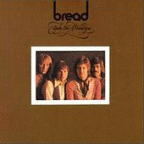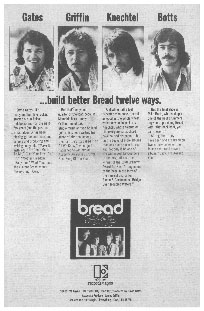![]()
  |

Baby I'm-A Want You
Bread
Elektra 75015
Released: January 1972
Chart Peak: #3
Weeks Charted: 56
Certified Gold: 3/9/72



 On this their fourth album, Bread has finally learned to checker-board their serious-romantic style with a comic-romantic one. They alternate fast songs with slow ones and in doing so help to get the overall effect of expression in-the-round, which their earlier albums lacked. "This Isn't What the Governmeant" may not be romantic, "Down on My Knees" may not be comic, and "Mother Freedom" certainly attempts to be neither, but even these songs help to generate the alternating-current energy of the album.
On this their fourth album, Bread has finally learned to checker-board their serious-romantic style with a comic-romantic one. They alternate fast songs with slow ones and in doing so help to get the overall effect of expression in-the-round, which their earlier albums lacked. "This Isn't What the Governmeant" may not be romantic, "Down on My Knees" may not be comic, and "Mother Freedom" certainly attempts to be neither, but even these songs help to generate the alternating-current energy of the album.
The very first notes of "Mother Freedom," the opening song, come by way of a raunchy, buzzing electric guitar to tell you that Bread mean to serve themselves with enough grit to compensate for the upcoming molasses. Little extra vocal touches, such as David Gates' near falsetto on the work "smack" and the muleskinner's heeyawh someone throws in during the repeat of "Freedom -- keep tryin'," add to "Mother Freedom," and are indicative of the care which all the vocals on the album have been delivered.
 Click image for larger view. |
Of course, even though inoffensive, some of their present love songs also just don't make it. "Diary," with its bland melody and an instrument which sounds like it's either an electric jew's harp or underwater, is a melodramatic piece about a fellow who finds and misinterprets the diary of the girl he's in love with, and like a character in an early Gide novel, he pledges his life to her nevertheless. Whereas Gates' ballads have an all-or-nothing extravagance about them, Jimmy Griffin's are comparatively cautious. Since his songs don't go for broke, he, unlike Gates, doesn't risk an occasional disaster for the sake of a big winner like Gates' "Everything I Own."
Further reading on Super Seventies RockSite!: Album Review: Album Review: Single Review: |
Bread has turned into one fine band of musicians. Even though it's placed in the background, Larry Knetchel's keyboard work always finds a way to stand out. As a drummer Mike Botts plays in the traditional rock group manner, solidly, carefully, distinctively. Baby I'm-A Want You is a full-bodied album, exuding health and vigor even in the thick of its most exaggerated sentimentality. The alternation of song styles produces a result which is often as tasty as good sweet and sour pork. It may not be a great album, or even a major one, but it's very heartening all the same.
- David Lubin, Rolling Stone, 3-30-72.
Bonus Reviews!
Bread has the same happy catholicism that the Lovin' Spoonful had: sweet-with-strings ballads, politely raunchy social and personal declarations, and messin'-around tunes, of which "Everything I Own," "Mother Freedom," and "I Don't Love You" are examples.
"Daughter" is the best track, both for the imagination of its characterization and for what the character has to say (in this case that "love is not out of style"). The group is self-sustaining, having taken care of its own songwriting, arrangements, and production. Juggling those responsibilities, they have still come out with a get-to-you album, which most artists who play many roles can't bring off. Nice going, boys.
- Joel Vance, Stereo Review, 10/72.
When Bread's first album was released, the group was dismissed in many circles as a Crosby, Stills, Nash & Young carbon. Since then, Bread has become one of the most consistent hit making musical aggregations in the U.S. and as the LP shows, they sure have that hit formula down pat; catchy and somewhat melodic rockers that are all under 3 1/2 minutes in playing time, just perfect for all those AM program directors who have made Bread this generation's Lettermen. Like The Guess Who, Bread has bridged the gap between bubblegum and progressive, though many of their ballads, like "Baby I'm-A Want You" and "Everything I Own" lean more towards the saccharine.
There is no doubt as to Bread's musicianship, for all its members are accomplished and respected studio musicians. As a matter of fact, when Robb Royer left the group, he was replaced by the ubiquitous keyboard man Larry Knetchel. The only problem is that instead of employing their talents in a new direction, Bread seems satisfied to turn out insipid hit singles.
- Jeff Samuels, Words & Music, June 1972.
By Bread's fourth album, Robb Royer was gone (though his presence is felt due to a couple of tracks he co-wrote with James Griffin), replaced by the versatile Larry Knetchel. This slight realignment makes this one of Bread's strongest records. If you only own the hits packages, you owe it to yourself to track this one down as well. * * * *
- Jim Worbois, The All-Music Guide to Rock, 1995.
![]() Reader's Comments
Reader's Comments
No comments so far, be the first to comment.
